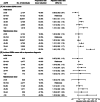Kidney function and prescribed dose in middle-aged and older patients starting selective serotonin reuptake inhibitors
- PMID: 36076345
- PMCID: PMC9545078
- DOI: 10.1002/pds.5515
Kidney function and prescribed dose in middle-aged and older patients starting selective serotonin reuptake inhibitors
Abstract
Purpose: To avoid adverse drug reactions, dose reductions are recommended when prescribing selective serotonin reuptake inhibitors (SSRIs) to patients with impaired kidney function. The extent of this practice in routine clinical care is however unknown. We aimed to evaluate the starting and maintenance SSRI doses prescribed to patients stratified by levels of kidney function in real-world practice.
Methods: Using data from the Stockholm CREAtinine Measurements (SCREAM) project, we identified 101 409 new users of antidepressants (including 52 286 SSRI users) in the region of Stockholm during 2006-2019, who were ≥50 years of age and had a recent creatinine test taken in order to estimate glomerular filtration rate (eGFR). SSRI dose reduction was defined as a prescribed SSRI dose of ≤0.5 defined daily doses, according to current recommendations. We examined the associations between eGFR and reductions in initial dose and maintenance dose of SSRIs using logistic regression models.
Results: Overall, reductions in initial and maintenance dose were observed among 54.1% and 34.1% of new SSRI users. Nevertheless, about 40% of individuals with an eGFR <30 ml/min/1.73 m2 were prescribed an SSRI without dose reduction. After adjusting for age and other covariates, lower eGFR was associated with moderately higher odds of dose reduction, for both initial and maintenance dose. Compared to individuals with an eGFR of 90-104 ml/min/1.73 m2 , the adjusted odds ratios for those with an eGFR <30 ml/min/1.73 m2 were 1.18 (95% CI: 1.03, 1.36) for initial dose reduction, and 1.49 (1.29, 1.72) for maintenance dose reduction. Stratified analyses showed stronger associations between lower eGFR and SSRI dose reduction among individuals aged 50-64 years and in those receiving prescriptions from psychiatric care.
Conclusions: Lower kidney function was moderately associated with a reduced SSRI dose, independently of age. Prescribing SSRIs to middle-aged and older patients should not only consider patients' age but also their kidney function.
Keywords: chronic kidney disease; dose adjustment; estimated glomerular filtration rate; prescribed dose; selective serotonin reuptake inhibitors.
© 2022 The Authors. Pharmacoepidemiology and Drug Safety published by John Wiley & Sons Ltd.
Conflict of interest statement
The authors declare no conflict of interest.
Figures




References
-
- Stevens PE, Levin A. Kidney disease: improving global outcomes chronic kidney disease guideline development work group members. Evaluation and management of chronic kidney disease: synopsis of the kidney disease: improving global outcomes 2012 clinical practice guideline. Ann Intern Med. 2013;158(11):825‐830. - PubMed
-
- Tonelli M, Wiebe N, Guthrie B, et al. Comorbidity as a driver of adverse outcomes in people with chronic kidney disease. Kidney Int. 2015;88(4):859‐866. - PubMed
-
- Palmer S, Vecchio M, Craig JC, et al. Prevalence of depression in chronic kidney disease: systematic review and meta‐analysis of observational studies. Kidney Int. 2013;84(1):179‐191. - PubMed
Publication types
MeSH terms
Substances
LinkOut - more resources
Full Text Sources
Medical
Research Materials
Miscellaneous

